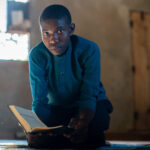The Chinese proverb, “If you want to know about water, don’t ask a fish,” means that when something is very common, we sometimes do not even see it. Injustice permeates every sector of our societies, from the education system that is tilted to benefit the wealthy, to family traditions that force young girls into early marriage. Injustice is so common and widespread that we sometimes fail to see it.
Injustices are so common and widespread that we sometimes fail to see them.
However, God says he “brings justice and righteousness to the earth, and … delight[s] in these things” (Jeremiah 9:24). Justice is at the heart of who God is. He says, “I, the Lord, love justice. I hate robbery and wrongdoing” (Isaiah 61:8). And just as the pointer on a compass is pulled to aim north, whenever we practice faith and justice, we point to God. He pulls the pointer on our justice compass to himself. However, many people in Africa and the world do not experience justice and face many kinds of injustice daily.
The Many Faces of Injustice
Against the Poor and Women
Judicial injustice undermines the fabric of many societies. If police routinely take bribes and court officials are for sale to the highest bidder, then justice is beyond the reach of ordinary Africans and it becomes impossible to trust the law. Too often citizens who need justice do not receive it by following due process. They think they have to resort to bribery and other corrupt means. When judicial injustice reigns in a society, the poor are the first to suffer. The warning of the prophet Amos could also be to those who undermine judicial justice today: “You trample the poor, stealing their grain through taxes and unfair rent. Therefore, though you build beautiful stone houses, you will never live in them. Though you plant lush vineyards, you will never drink wine from them…You oppress good people by taking bribes and deprive the poor of justice in the courts” (Amos 5:11-12).
When judicial injustice reigns in a society, the poor are the first to suffer.
Injustices against women come in many forms. Female genital cutting carries risks such as severe bleeding, problems with urination, infections, infertility, and complications in childbirth. Other injustices against women include forced marriages for underage girls, abuse, and wife inheritance. It should not be assumed that widows are unable to manage the possessions they shared with their husbands. Forced marriage can allow greedy relatives to steal from widows.
Slavery and Trafficking
Human trafficking, a modern form of slavery, is an injustice that makes a lot of money for traffickers around the world—more than US$30 billion a year. More than two hundred years ago, millions of Africans were forcefully captured, sometimes by other Africans, and taken by slave traders to Europe, the Caribbean, and America. Such slavery is a terrible, but very real, part of our heritage. In the 19th century, the slave trade was largely abolished. But today tens of thousands of Africans are held in slavery, sometimes in their own country.
Human trafficking involves recruiting, transporting, and selling victims for forced labour or sex.
Human trafficking involves recruiting victims, transporting them, and selling them or their services for forced labour or sex. Slavery involves violence such as the abduction of 276 girls from a government secondary school in Nigeria by the Boko Haram. Or enslavement may involve unnoticed events such as a trafficker asking a girl to marry him. After they are married and move to another country, the trafficker can sell the girl.
Most victims of human trafficking are children and women. But boys are also trafficked and forced into street vending, domestic service, mining, and begging. One Asian man went to Kenya because he was promised good money and a good life if he strip-danced in a night club. After he left his country, his travel documents were taken away. He became a slave of his hosts, who could do whatever they wanted with him.
Systemic Mistreatment of Foreigners
Injustices against foreigners can occur when they are trafficked across a border or come to our countries as strangers. Even those who have lived with us for many generations, such as those from India, can be seen as foreigners. Some aliens suffer twice. They may have run away from the violence and injustice they faced in their own countries in order to go to a more peaceful country. But in their new country, they may discover that they are victimised by law enforcement officers and jailed if they cannot pay a bribe.
The law should not only protect those who are in power.
Such foreigners have not committed a crime. When their hopes are dashed by those who are supposed to protect them, life itself can seem hopeless. Foreign women’s rights are violated and nobody is there to defend them. God told the children of Israel, “Do not take advantage of foreigners who live among you in your land. Treat them like native-born Israelites, and love them as you love yourself” (Leviticus 19:33-34). The law should protect not only those who are in power, but every citizen and foreigner as well.
Africa’s Checkered History
A particularly terrible form of injustice is crimes against humanity such as murder, torture, rape, enslavement, or imprisonment used by someone in power against civilians. Powerful people around the world have committed crimes against humanity throughout history, from Pol Pot in Cambodia, to Adolf Hitler in Germany, and even King Henry VIII and his daughter “Bloody Mary” in England.
But in 2015, the International Criminal Court listed the five people who were most wanted for crimes against humanity. All five were Africans. It is a problem we may face daily in our countries. Frequently such crimes against humanity are aimed at particular tribes or groups of people, such as the 1994 genocide in Rwanda when Hutus slaughtered Tutsis and moderate Hutus.
Powerful people around the world have committed crimes against humanity throughout history.
We still live with the results of historical injustices. When colonial powers came to Africa, many exploited our resources and tried to eliminate our traditional culture. One example is that although there were many benefits to schools and churches, the colonial rulers at times used them to violently and systematically alienate Africans from our own traditional culture. There was a lot of good, particularly with missionaries, but colonial powers often brought oppression and injustice as well.
In response, we tried to reclaim our land and culture. The Mau Mau struggle in Kenya in the 1950s was one response to the far-reaching effects of cultural alienation. The Mau Mau struggle was successful in getting the British to leave Kenya. But, like the colonialists, there were both good and bad aspects of this violent struggle.
What Should We Make of All This Injustice?
Christians who understand God’s heart will be heartbroken over these injustices. For they know that every man and woman is created in the image of God (Genesis 1:26-31). They know that God loves the orphan, the widow, the stranger—the powerless in our society (Deuteronomy 10:17-19). They know that Jesus tells us to show mercy like the Samaritan did. The Samaritan helped a man, presumably a Jew who despised Samaritans. The Jewish man had been attacked and the Samaritan man stopped to soothe his wounds, bandage them, take him to an inn, and pay for his care (Luke 10:25-37). In this way, believers should reflect the heart of God (see Micah 6:8).
Christians are not surprised at evil. They know there are “wicked people who suppress the truth by their wickedness” (Romans 1:18). And since such wicked people “thought it foolish to acknowledge God, he abandoned them to their foolish thinking and let them do things that should never be done” (Romans 1:28-32).
Christians who understand God’s heart will be heartbroken.
People today know when things are not just. God did not create the world for human trafficking, wars, rapes, organised prostitution, and child abuse. When Jesus came with the good news about God’s new Kingdom (Mark 1:15), he said that those who became part of this Kingdom should care for the hungry, the thirsty, the alien, those without clothes, and those in prison (Matthew 25:35-36). Jesus is speaking to those who have been restored to fellowship with God. After listing some terrible sins, Paul says, “Some of you were once like that. But you were cleansed” (1 Corinthians 6:11). Jesus says we are to help restore others and give them the dignity that God intended they should have.
What Can We Do?
Start Small and Local
Start small. Be a voice in your church that encourages people to respond to specific needs around you. A small Bible study group in a Mavuno church in Kenya realised that inmates in prison were not provided with beds and had to sleep on the floor. They began by visiting one prison and took a few beds and mattresses. They continued to do this month after month until all inmates in that prison had beds. The leadership of their church told other churches what the Bible study group had done and other groups in other churches began doing the same thing. What began as a small effort by a few individuals has now had an impact in five countries.
Christians cannot complain about injustice and then mistreat those who work in their households.
Be aware of how you treat other people. Some Christians overwork their maidservants and pay them very little money. They make the maidservants work all year with only a few days’ break. Some Christians even make their maidservants go to church with them on Sunday, not to worship but to take care of the children. If the maidservant had her choice, she might pick a different church. This is a form of slavery. Christians cannot complain about injustice and then mistreat those who work in their households. Christians should be flagbearers for justice, starting in their own homes.
Be a Voice for the Voiceless
God calls some of us to point out the injustices we see. This will give us an opportunity to become the voice of the voiceless. If we know the people involved, we can speak to them or we can write letters to newspapers or speak to our government representatives. Sometimes God calls us to act sacrificially.
We should not stay silent when there is injustice in our place of work or community.
After the Marange diamond fields were discovered in Zimbabwe in 2006, they were open to anyone, and illegal mining and smuggling flourished. The government stepped in with the result that horrific abuses took place. In 2010, Farai Maguwu partnered with Human Rights Watch to document beatings, torture, forced labour, and killings of local villagers in Marange at the hands of soldiers. The government opposed Maguwu, and he was arrested many times. However, his efforts paid off because of the international attention he brought. Farai Maguwu is an example of what one person can do to combat injustice. We should not stay silent when there is injustice in our place of work, our community, or the government.
Don’t Leave It to the Government
Whose duty is it to make right the injustices in our society? Some think it is the work of the government. Others think it is the work of churches. God says bringing justice is the responsibility of each Christian. In his book The City of God, Augustine, who was bishop in what is today Algeria, compared the glorious City of God with the earthly city full of lust and misrule. Christians belong to both cities, and they know that they are to live on earth as a picture of what it is like in the City of God. Christians should act justly in an unjust society and live as people who walk daily with God.
Points to Remember
- God is a God of justice. God is just and his Kingdom is based on justice. Injustice in all forms is not of God.
- Every man and woman is created in the image of God and deserves dignity and honour.
- Sin has entered the human race. Injustice is caused by sin. Do not be surprised when you encounter “wicked people who suppress the truth by their wickedness.”
- Justice demands action. You have the power to do something. Each believer has a part to play in God’s Kingdom. No matter how small your part may be, when you work to restore someone’s dignity and bring justice, what you do is important to God.

The Africa Study Bible app is available on the Tecarta Bible App, the world’s best study Bible app, which is available to download on Google Play Store and Apple App Store.
Contact Oasis Regional Directors to order your Africa Study Bible:
- Regional Director East Africa: WhatsApp: +27 79 572 4877
- Regional Director West Africa: WhatsApp +234 809 111 1184














